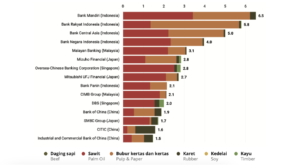The Jakarta Workshop CSO Statement on Palm Oil and Finance
From July 3-5, 2013, representatives of 50 civil society organizations (CSOs) from Malaysia, Indonesia, Philippines, Europe, Japan and North America came together in Jakarta to explore impacts and issues related to private sector financing of the palm oil sector in Southeast Asia. Participants developed the following statement:
Rapid and reckless expansion of large oil palm estates in SE Asia in combination with weak governance, unclear land tenure, and poor spatial planning is imposing human rights violations and billions of dollars in negative environmental, social and economic externality costs on the public at scales ranging from local communities to the global commons.i
These unaccounted for costs include those associated with destruction of millions of hectares of rainforests, an associated loss of biodiversity, massive release of climate changing emissions, regional air pollution, public health impacts, social conflicts, and land grabbing, in contradiction to internationally recognized principles and norms of sustainable development and the protection of human rights.
Palm oil from SE Asia is now found in consumer products in countries around the world, making its association with deforestation and social conflict a global reality and responsibility.
We believe that governments, the private sector and civil society have shared and differentiated responsibilities to address and resolve these issues. The private finance sector plays a key and unique role as a provider of capital to the palm oil sector, which, lacking appropriate safeguards and environmental and social performance safeguards and effective application, enables destructive and often illegal palm oil expansion.
Land bank and plantation expansion is still the primary indicator for most analysts and asset managers in evaluating plantation companies’ economic outlook, but such expansion is more and more an unsustainable and high-risk economic strategy. Instead, investors should develop alternative economic indicators, which align with social and environmental values such as increasing yields for smallholders.
Participants at the Jakarta workshop call on government regulators, banks and investors to develop palm oil finance performance standards and due diligence procedures to avoid financing of palm oil companies that fail to address the following issues of common concern.
Climate Change – The impacts of climate particularly threaten the natural resources and livelihoods of rural populations in developing countries. Anthropogenic climate change has been described as the largest market failure in human history.ii
Greenhouse gas emissions from peat land degradation in SE Asia are already equivalent to those from the transport sectors globally. The use of fires to clear peatlands is a major contributor to regional air pollution alerts, and imposes billions of dollars in public health costs and economic damages.
Oil palm expansion is a major driver of peatland degradation. Palm oil plantations on peatlands are projected to triple in the next one to two decades, with upwards of half a billion tons of associated CO2 emissions annually, unless current trends are reversed.iii
We believe the finance sector has a fiduciary duty and ethical obligation to ensure that its financing across all sectors of the global economy contribute to low carbon development pathways. Consistent with this, following its two year review of financing to the oil palm sector, World Bank group policies now explicitly prohibit financing of oil palm expansion on peatlands.iv
We call on the finance sector to ensure that all its financing to the oil palm sector strictly prohibits further direct or indirect conversion, expansion, drainage or the setting of fires on any peatlands and to support peatland restoration.
Biodiversity and Deforestation– SE Asia’s rainforests are globally significant reservoirs of biological diversity, including for iconic species such as the critically endangered Sumatran orangutans, tigers, elephants and rhinos. As recently as the 1960s, about 80 percent of Indonesia was forested, but with one of the highest deforestation rates in the world, less than half of Indonesia’s original forest cover remains.
Ninety percent of oil palm expansion in Indonesian Borneo has occurred at the expense of tropical rainforests. At the same time, due to failures of effective spatial planning, millions of hectares of forests were cleared for oil palm and then abandoned.
Signaling the growing commercial urgency of the issue for producers, valuable consumer markets for palm oil increasingly demand deforestation-free, peatland expansion-free palm oil from their suppliers.
We call on banks and investors to ensure financing contributes to achieving zero deforestation, to sever ties with producers and suppliers linked to ongoing deforestation, and to support the development of government polices that further forest protection.
Rights of indigenous peoples and forest dependent communities – Standing forests are important sources of food, medicines and materials essential to the livelihoods of tens of millions of people in SE Asia. Corresponding to the regions rich biological diversity is its rich cultural diversity, with over 500 hundred distinct indigenous languages in Indonesia alone.
At the same time, the customary land rights of indigenous peoples and forest dependent peoples are too often not recognized or respected by governments, who award concessions for industrial oil palm concessions over their traditional lands without their free, prior and informed consent. This failure is provoking human rights violations, social conflicts and loss of livelihoods, and cultural diversity and identity.
We call on banks and investors to adopt financing safeguards consistent with upholding the rights of indigenous peoples, as articulated in the UN Declaration on the Rights of Indigenous Peoples (UNDRIP), and to limit support to palm oil producers that can demonstrate that they respect the right of indigenous peoples and local communities to give or withhold their free, prior and informed consent to proposed developments and respect their customary rights to their lands and forests.
Forest Governance, Corruption and Money Laundering – Weak forest governance, pervasive corruption and widespread money laundering and tax evasion rob governments of billions of dollars in revenues that would otherwise be available to support essential and badly needed public services such as education, health and infrastructure.
A study by Human Rights Watch found that between 2003 and 2006, an annual $2 billion in revenue lost to corruption and mismanagement in the timber sector in Indonesia was equal to the entire health spending at national, provincial, and district levels combined. This does not include additional losses due to tax evasion.
According to records obtained from the Indonesian Ministry of Forests, potential forestry sector revenue losses related to irregularities in licensing procedures for 727 problematic oil palm plantation units and 1722 mining units in seven Provinces were predicted at $25 billion in 2011.v
Indonesia is ranked 118th out of 176 countries on the Transparency International Corruption Perception Index, and is the fifth worst among SE Asian countries. Law enforcement is still weak, although a bribery case for obtaining a palm oil permit in Central Sulawesi was recently successfully prosecutedvi, and a $450 million fine levied for tax evasion against the large palm oil company, Asian Agri, is currently being litigated.vii Both cases are illustrative of wider patterns of endemic corruption running throughout the sector. Law enforcement can be made more effective if law enforcement officials use an approach integrating Corruption Law, General Provisions and Taxation Procedures Law and Money Laundering Law.
The finance sector also has a major role. However, the finance sector is too often implicated in aiding and abetting this criminal financial activity, which lines the pockets of a few at the expense of the public.
We call on the finance sector to aggressively increase due diligence efforts to identify and report suspected money laundering activities to appropriate authorities, and to avoid all financing to palm oil sector companies and their suppliers suspected of engaging in bribes, tax evasion or money laundering.
Working Conditions – Malaysia and Indonesia’s palm oil sectors are listed by the US Department of Labor as being at significant risk of using child and forced labor in violation of international norms and conventions.
In addition to the risks of forced and child labor, migrant workers and their families generally have minimal rights and protections, and commonly suffer from sub-standard labor and living conditions, and lack of access to adequate health care and education for children.
Dangerous and highly hazardous pesticides, including paraquat, are still too widely used, posing numerous risks to workers, children and their families and threatening the reproductive rights of women. The use of appropriate personal protective equipment for these pesticides is often impractical for workers in hot tropical conditions, as well as being ineffective in preventing long-term harm.
We call on the finance sector to adopt zero tolerance policies for maintaining banking or investor relationships with producers and suppliers linked to child or forced labor.
Similarly, we call on banks and investors to ensure that their financing is limited to palm oil producers that do not use paraquat or other dangerous chemicals.
Land Grabbing and Food Sovereignty – large industrial oil palm plantations are too often imposed on rural communities to the detriment of communities’ rights over their productive resources, existing local food production and food security. This is taking place around Southeast Asia and increasingly in Africa and Latin America in a process commonly referred to as “land-grabbing”; the buying or leasing of large pieces of land in developing countries, by domestic and transnational companies, governments, and individuals, with negative consequences for local communities.
We call on banks and investors to end any financing of industrial palm oil plantations associated with land grabbing and to ensure that any remaining financing to the palm oil sector is consistent with implementation of the FAO Voluntary Guidelines on the Responsible Governance of Tenure of Land, Fisheries and Forests in the Context of National Food Security.
Supply chain traceability – Supply chain traceability and control starting from suppliers of oil palm fresh fruit bunches to processing mills through to end users is an essential tool for promoting responsible palm oil production practices, eliminating illegal and egregious sources from global supply chains and ensuring accountability.
We call on banks and investors to avoid financing of palm oil producers, refiners and traders that are unable or unwilling to implement full traceability systems in their supply chains back to all growers.
Conflict resolution and human rights – Indonesia’s National Land Agency has registered more than 3,000 conflicts between local communities and palm oil companies. Communities resisting the takeover of their forests and farms for palm oil plantations are too commonly treated as criminals, subject of policy harassment and beatings, imprisonment of village leaders, forced relocations and extra-judicial killings. Regional authorities have the capacity to issue licenses, but lack the capacity to prevent and remedy social conflicts associated with these new licenses, making conflicts inevitable.
Under the UN Guiding Principles on Business and Human Rights, banks and investors have an obligation to respect and help remedy conflicts and human rights violations. We call on banks and investors to ensure that they assess what conflict resolution mechanisms, if any, of palm oil producer, traders and refining companies have and their effectiveness and do not finance companies without effective conflict resolution mechanisms. In addition, banks and institutional investors should create conflict resolution mechanisms of their own for any palm related financing which can be accessed by impacted rights-holders and stakeholders and functions to ensure that rights are respected and upheld.
Regulatory Governance of the Financial Sector – Government has a unique regulatory role that includes close oversight of the financial sector. Green banking regulatory initiatives reflect growing recognition that it makes little sense to allow financing of projects and activities that worsens the very social and environmental problems that government policies are attempting to address and reverse. In Indonesia, for example, the president has committed to a 26% reduction in greenhouse gas emissions below the projected business as usual emission level by 2020, and yet financing in key sectors like oil palm, which are drivers of deforestation and social conflict, is allowed to continue, without use of sector best practice ESG performance standards, due diligence requirements and other accountability measures. In Brazil, government mandated improvements in environmental due diligence requirements for rural credit programs in the Amazon reduced deforestation by 15%, or over 2,700 km2, from 2009 to 2011, demonstrating a clear link between government credit policy and deforestation rates.viii
We call on relevant financial regulatory bodies to develop mechanisms to ensure that: best-practice oil palm sector performance standards are consistently adopted and implemented by financial institutions; financial institutions are held accountable for compliance; accessible dispute resolution mechanisms are established; and these measures include regular and transparent reporting by regulatory agencies on the performance of individual financial institutions in contributing to the achievement of regulatory policies and the goals outlined in this statement for the oil palm sector.
Signed:
Externality costs include those related to loss of local ecosystem services such as hydrological functions and flood mitigation; loss of access by local communities to forest products including foods, medicines and other products for local consumption; impacts on drinking water and fisheries; loss of livelihoods; forced migration; public health impacts of fires; impacts of fire haze events on regional economic activity; and the social costs of high carbon emissions. The 1997-98 fires alone imposed $9 billion in regional economic costs according to estimates from the Asian Development Bank. 2.2 million hectares of oil palm plantations are planted on peat in Indonesia and Malaysia, with associated emissions, excluding fires, of around 180 Mt of CO2/year. The US government uses a social cost of $37 per ton of CO2 emissions, which if applied to peatland palm oil sector emissions implies a social cost of nearly $7 billion/year for this factor alone. Local social and environmental externality costs would be in addition to regional and global costs. Sources: http://news.mongabay.com/2012/0813-hance-fires-pollution-health.html; http://news.mongabay.com/2013/0621-haze-singapore.html; http://www.theicct.org/review-peat-surface-greenhouse-gas-emissions-oil-palm-plantations-southeast-asia; http://www.theicct.org/sites/default/files/publications/ICCT_palm-expansion_Feb2012.pdf; http://rfflibrary.wordpress.com/2013/06/06/technical-support-document-technical-update-of-the-social-cost-of-carbon-for-regulatory-impact-analysis-under-executive-order-12866/
iiFrom the 2006 Stern Review on the economic impacts of climate change. http://www.wwf.se/source.php/1169157/Stern%20Report_Exec%20Summary.pdf
iiiA review of the extent and trends of palm oil plantations on peatlands projects expansion on peat will triple sometime between 2020 and 2030 to over 6 million hectares. With an average emissions rate from peat oxidation estimated at 85 tons of CO2/ha/yr, total CO2 emission associated with oil palm plantations on peat will rise to over 500 million tons of CO2 emissions per year. Emissions from deforestation or fires would be additional to this. http://www.theicct.org/review-peat-surface-greenhouse-gas-emissions-oil-palm-plantations-southeast-asia; http://www.theicct.org/sites/default/files/publications/ICCT_palm-expansion_Feb2012.pdf;





Leave a Reply
Want to join the discussion?Feel free to contribute!